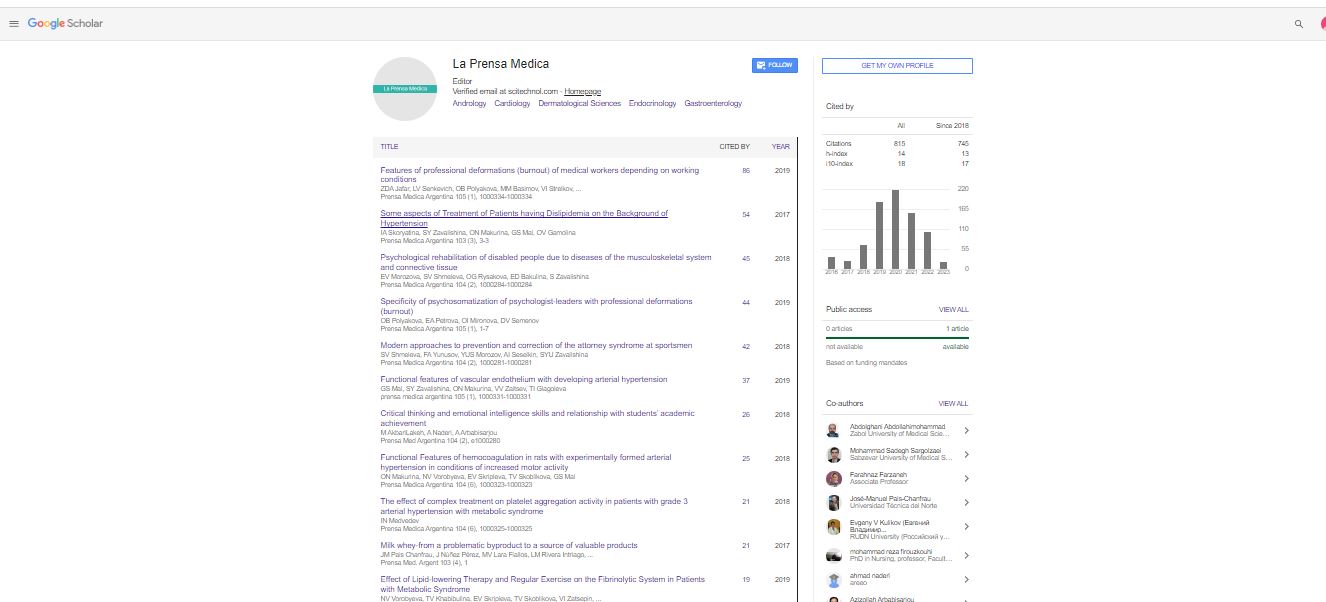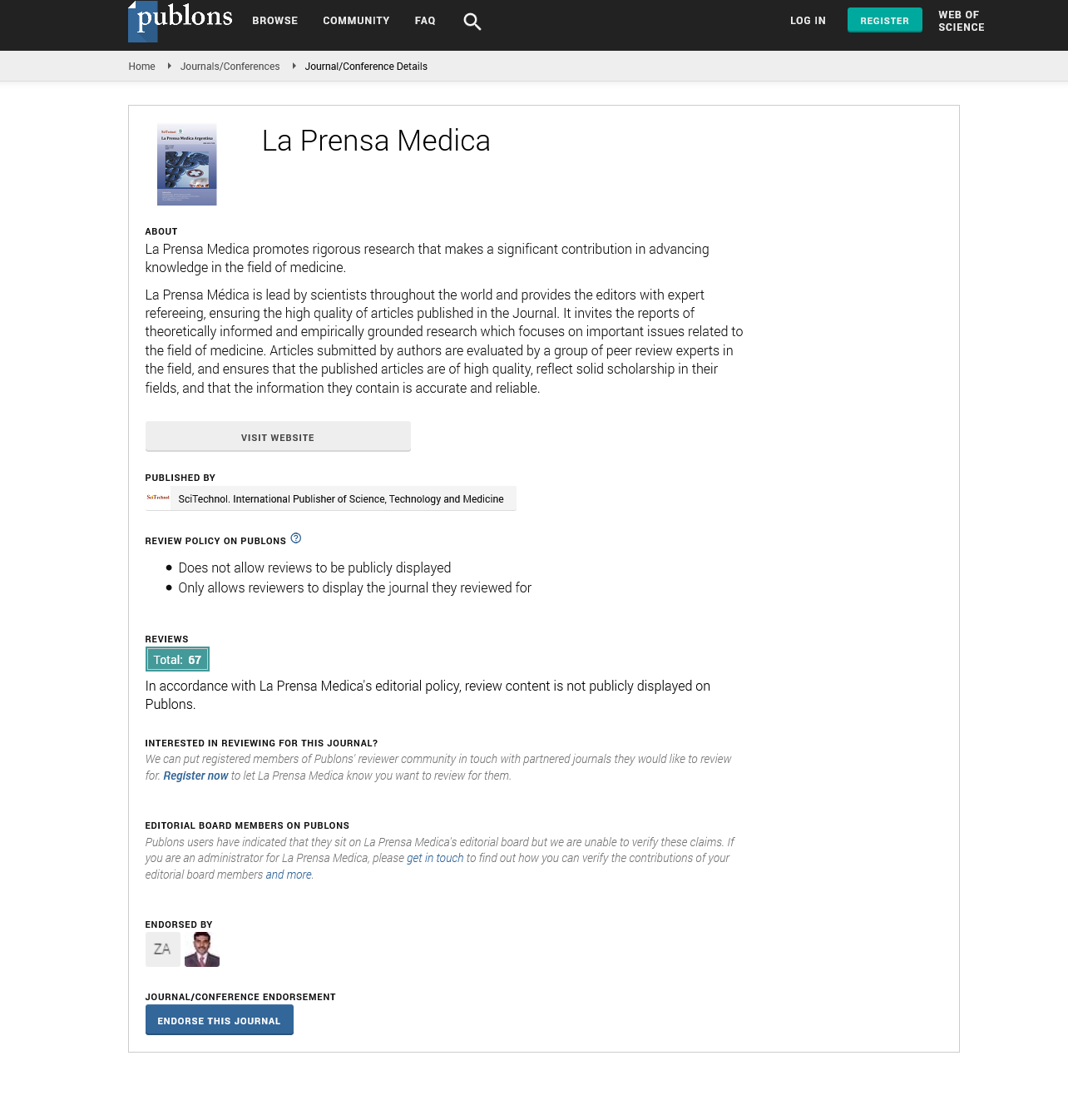Perspective, La Prensa Medica Vol: 108 Issue: 4
Relationship between Critical Thinking and Emotional Intelligence Skills and Academic Achievement
Faraz Ahmed*
Department of Occupational Therapy, King Abdul Aziz University Jeddah, Saudi Arabia
*Corresponding Author: Faraz Ahmed, Department of Occupational Therapy, King Abdul Aziz University Jeddah, Saudi Arabia, E-mail:farazbokhari@gmail.com
Received date: 01 April, 2022, Manuscript No. LPMA-22-64906;
Editor assigned date: 04 April, 2022, PreQC No. LPMA-22-64906 (PQ);
Reviewed date: 18 April, 2022, QC No LPMA-22-64906;
Revised date: 25 April, 2022, Manuscript No. LPMA-22-64906 (R);
Published date: 30 April, 2022, DOI: 10.4172/0032-745X.1000140
Citation: Ahmed F (2022) Relationship between Critical Thinking and Emotional Intelligence Skills and Academic Achievement. La Prensa Medic 108.
Keywords: Andrology, Cardiology, Dermatological Sciences, Emergency and Internal medicine, Endocrinology
Description
The present study aims to use TEIQue- SF to study particularity EI measures on a sample of undergraduate medical recuperation scholars in a Saudi public sector university. The choice of the shorter interpretation is grounded on conciseness, prophetic validity, and good abecedarian psychometric parcels covering pupil and nonstudent samples across the world. There's a considerable quantum of interest around emotional Command and how it affects us. TEI in this regard has come up with some important theorizations, one of them being its link with academic achievement. We conclude that the TEi construct may be different, and might have further circular pathways that link it to academic performance. The present study examined the relationship of the Particularity Emotional Intelligence Questionnaire Short Formand academic achievement. Analyses were performed using a sample of Saudi- origin medical recuperation undergraduate scholars. The present study examined the psychometric parcels of the Chinese interpretation of the Particularity Emotional Intelligence Questionnaire Short Form (TEIQue- SF). Analyses were performed using a sample of undergraduates signed from four universities across China. One hundred thirty medical recuperation scholars completed the Particularity Emotional Intelligence Questionnaire- Short Form. Descriptive and deducible statistical analyses were carried out to interpret connections between colorful variables. The present study is one of two studies that has delved the train EI-academic achievement link in healthcare- related scholars. Our findings reverberate with being literature on the subject.
Critical Thinking, Emotional Intelligence
Critical thinking is an essential skill that medical scholars need to master due to the necessity of making complex judgments in healthcare settings. Examining medical scholars critical thinking and the associated factors can inform preceptors on how to equip scholars for effective critical thinking. This exploration aimed to estimate critical thinking among medical scholars, and the correlations of emotional intelligence and five conflict operation styles with critical thinking were also delved. Across-sectional study of medical scholars from the Jilin University was conducted using a questionnaire. Data were analysed using t- tests, one- way ANOVA, Pearson correlation analysis, and direct retrogression analysis. 269 medical undergraduates completed this study. The mean critical thinking score indicating positive to strong critical thinking tendency. Gender or time of study wasn't statistically significantly associated with critical thinking. Emotional intelligence was a significant predictor of critical thinking advanced emotional intelligence scores were associated with advanced critical thinking scores. Integration, domination, and compliance showed a significant association with critical thinking. The further scholars used the integration style, the more positive their critical thinking score was. The further scholars used the domination and compliance styles, the further negative their critical thinking score was. These findings point to an implicit link between medical scholars ’ critical thinking, emotional intelligence and conflict operation chops, all of which are demanded to make critical clinical judgements, manage their own feelings and the feelings of others and to manage plant conflict. Farther disquisition to explore these associations and the part of addition of these motifs in the undergraduate class is needed.
Critical Thinking Disposition of Undergraduate Students
Undergraduate pupil, especially first- time scholars face challenges in the new plant academic terrain. Critical thinking (CT) has been plant to be effective in managing negative gests. Before literature plant Emotional intelligence (EI) is reckoned for friction in critical thinking (CT) skill irrespective of the gender. Still, there's failure of exploration on the relationship between EI and CT disposition with respect to gender. The present exploration intended to study the effect of EI on CT disposition of scholars in the transition phase with gender as a prolocutor. 500 first- time undergraduate scholars from West Bengal (eastern part of India) were named to fill up assessment tools; the Profile of Emotional Capability and Critical Allowing Disposition Assessment. Structural Equation Model (SEM) was followed using AMOS espousing maximum liability approach. Path analysis revealed an accepted model fit establishing EI to have significant effect on CT disposition. Still, this effect wasn't moderated by gender. The present exploration might be helpful in generating mindfulness regarding the significance of EI and training for developing disposition of CT among council fresher's well- being and emotional health. The study has stressed thenon-significant moderating part of gender in relation to EI and CT disposition that was missing in the being literature.
 Spanish
Spanish  Chinese
Chinese  Russian
Russian  German
German  French
French  Japanese
Japanese  Portuguese
Portuguese  Hindi
Hindi 

